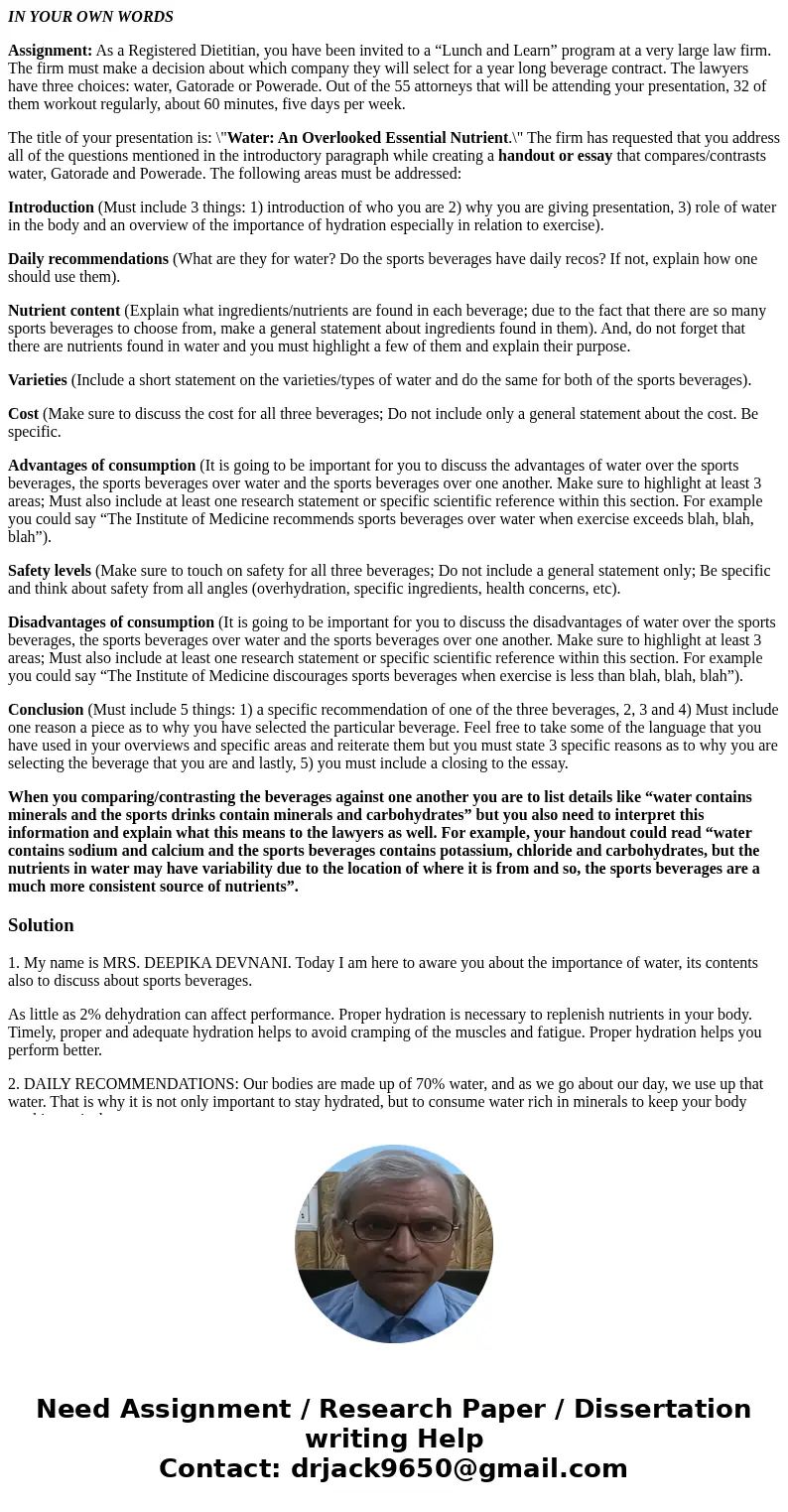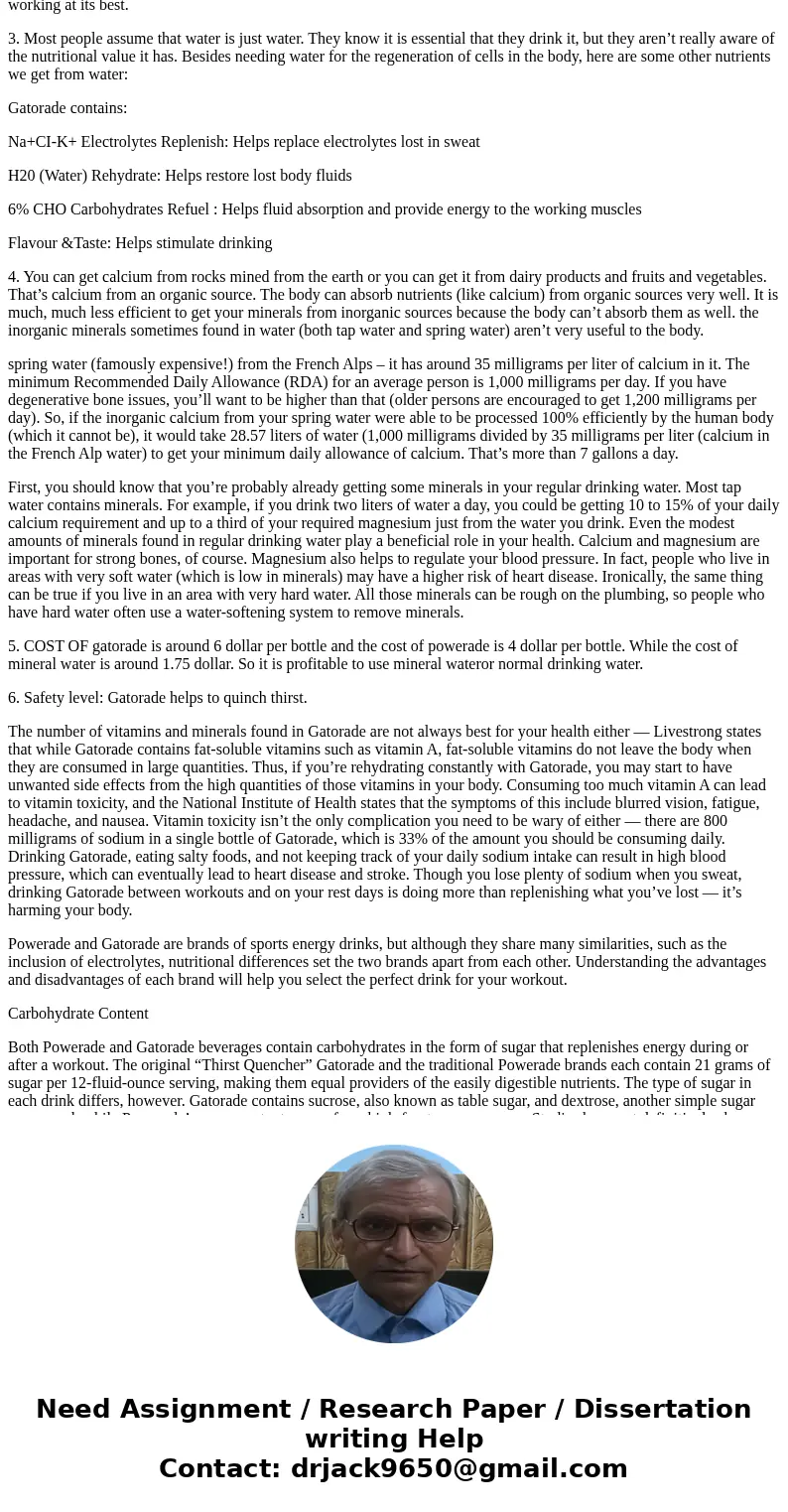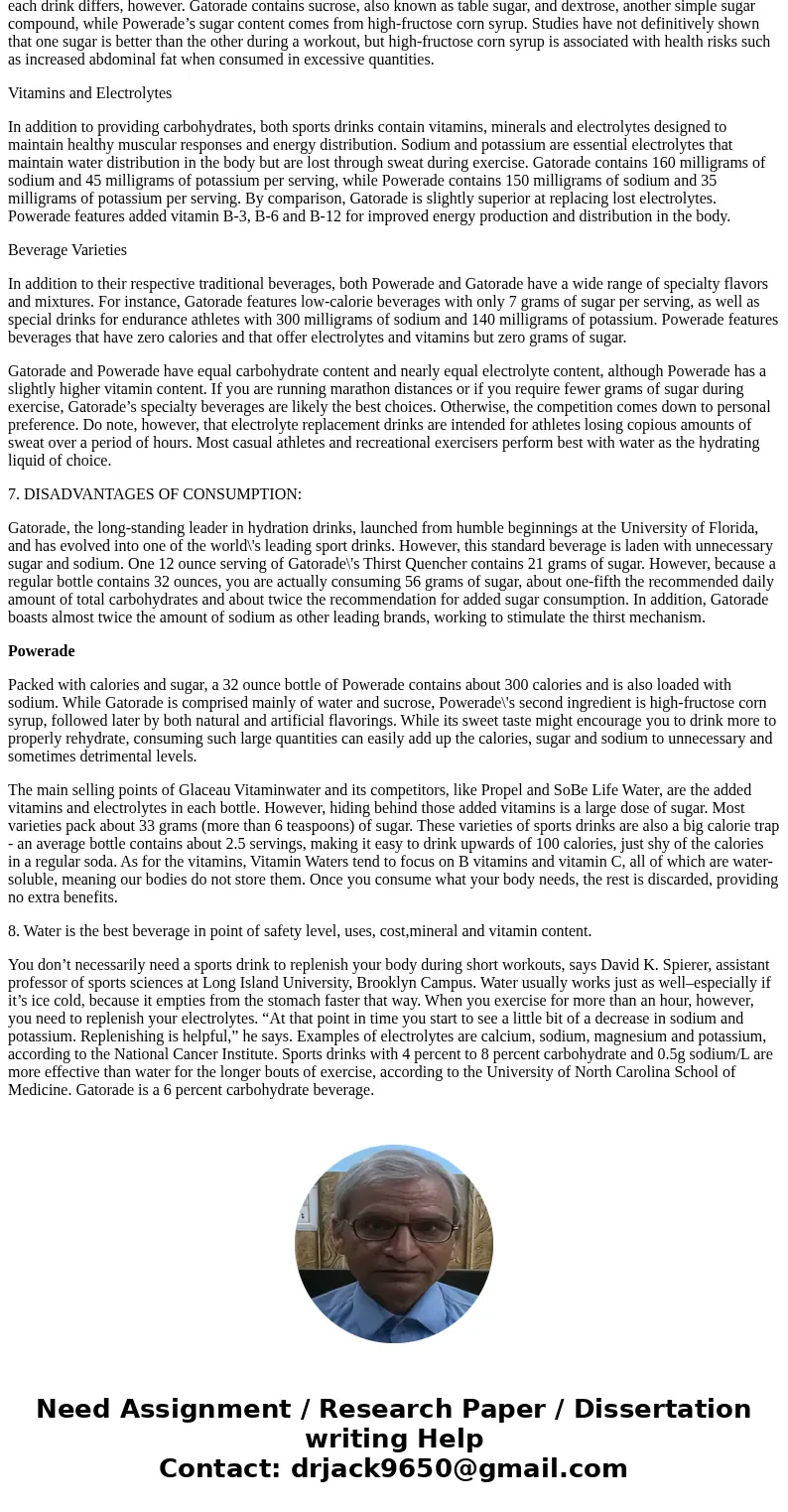IN YOUR OWN WORDS Assignment As a Registered Dietitian you h
IN YOUR OWN WORDS
Assignment: As a Registered Dietitian, you have been invited to a “Lunch and Learn” program at a very large law firm. The firm must make a decision about which company they will select for a year long beverage contract. The lawyers have three choices: water, Gatorade or Powerade. Out of the 55 attorneys that will be attending your presentation, 32 of them workout regularly, about 60 minutes, five days per week.
The title of your presentation is: \"Water: An Overlooked Essential Nutrient.\" The firm has requested that you address all of the questions mentioned in the introductory paragraph while creating a handout or essay that compares/contrasts water, Gatorade and Powerade. The following areas must be addressed:
Introduction (Must include 3 things: 1) introduction of who you are 2) why you are giving presentation, 3) role of water in the body and an overview of the importance of hydration especially in relation to exercise).
Daily recommendations (What are they for water? Do the sports beverages have daily recos? If not, explain how one should use them).
Nutrient content (Explain what ingredients/nutrients are found in each beverage; due to the fact that there are so many sports beverages to choose from, make a general statement about ingredients found in them). And, do not forget that there are nutrients found in water and you must highlight a few of them and explain their purpose.
Varieties (Include a short statement on the varieties/types of water and do the same for both of the sports beverages).
Cost (Make sure to discuss the cost for all three beverages; Do not include only a general statement about the cost. Be specific.
Advantages of consumption (It is going to be important for you to discuss the advantages of water over the sports beverages, the sports beverages over water and the sports beverages over one another. Make sure to highlight at least 3 areas; Must also include at least one research statement or specific scientific reference within this section. For example you could say “The Institute of Medicine recommends sports beverages over water when exercise exceeds blah, blah, blah”).
Safety levels (Make sure to touch on safety for all three beverages; Do not include a general statement only; Be specific and think about safety from all angles (overhydration, specific ingredients, health concerns, etc).
Disadvantages of consumption (It is going to be important for you to discuss the disadvantages of water over the sports beverages, the sports beverages over water and the sports beverages over one another. Make sure to highlight at least 3 areas; Must also include at least one research statement or specific scientific reference within this section. For example you could say “The Institute of Medicine discourages sports beverages when exercise is less than blah, blah, blah”).
Conclusion (Must include 5 things: 1) a specific recommendation of one of the three beverages, 2, 3 and 4) Must include one reason a piece as to why you have selected the particular beverage. Feel free to take some of the language that you have used in your overviews and specific areas and reiterate them but you must state 3 specific reasons as to why you are selecting the beverage that you are and lastly, 5) you must include a closing to the essay.
When you comparing/contrasting the beverages against one another you are to list details like “water contains minerals and the sports drinks contain minerals and carbohydrates” but you also need to interpret this information and explain what this means to the lawyers as well. For example, your handout could read “water contains sodium and calcium and the sports beverages contains potassium, chloride and carbohydrates, but the nutrients in water may have variability due to the location of where it is from and so, the sports beverages are a much more consistent source of nutrients”.
Solution
1. My name is MRS. DEEPIKA DEVNANI. Today I am here to aware you about the importance of water, its contents also to discuss about sports beverages.
As little as 2% dehydration can affect performance. Proper hydration is necessary to replenish nutrients in your body. Timely, proper and adequate hydration helps to avoid cramping of the muscles and fatigue. Proper hydration helps you perform better.
2. DAILY RECOMMENDATIONS: Our bodies are made up of 70% water, and as we go about our day, we use up that water. That is why it is not only important to stay hydrated, but to consume water rich in minerals to keep your body working at its best.
3. Most people assume that water is just water. They know it is essential that they drink it, but they aren’t really aware of the nutritional value it has. Besides needing water for the regeneration of cells in the body, here are some other nutrients we get from water:
Gatorade contains:
Na+CI-K+ Electrolytes Replenish: Helps replace electrolytes lost in sweat
H20 (Water) Rehydrate: Helps restore lost body fluids
6% CHO Carbohydrates Refuel : Helps fluid absorption and provide energy to the working muscles
Flavour &Taste: Helps stimulate drinking
4. You can get calcium from rocks mined from the earth or you can get it from dairy products and fruits and vegetables. That’s calcium from an organic source. The body can absorb nutrients (like calcium) from organic sources very well. It is much, much less efficient to get your minerals from inorganic sources because the body can’t absorb them as well. the inorganic minerals sometimes found in water (both tap water and spring water) aren’t very useful to the body.
spring water (famously expensive!) from the French Alps – it has around 35 milligrams per liter of calcium in it. The minimum Recommended Daily Allowance (RDA) for an average person is 1,000 milligrams per day. If you have degenerative bone issues, you’ll want to be higher than that (older persons are encouraged to get 1,200 milligrams per day). So, if the inorganic calcium from your spring water were able to be processed 100% efficiently by the human body (which it cannot be), it would take 28.57 liters of water (1,000 milligrams divided by 35 milligrams per liter (calcium in the French Alp water) to get your minimum daily allowance of calcium. That’s more than 7 gallons a day.
First, you should know that you’re probably already getting some minerals in your regular drinking water. Most tap water contains minerals. For example, if you drink two liters of water a day, you could be getting 10 to 15% of your daily calcium requirement and up to a third of your required magnesium just from the water you drink. Even the modest amounts of minerals found in regular drinking water play a beneficial role in your health. Calcium and magnesium are important for strong bones, of course. Magnesium also helps to regulate your blood pressure. In fact, people who live in areas with very soft water (which is low in minerals) may have a higher risk of heart disease. Ironically, the same thing can be true if you live in an area with very hard water. All those minerals can be rough on the plumbing, so people who have hard water often use a water-softening system to remove minerals.
5. COST OF gatorade is around 6 dollar per bottle and the cost of powerade is 4 dollar per bottle. While the cost of mineral water is around 1.75 dollar. So it is profitable to use mineral wateror normal drinking water.
6. Safety level: Gatorade helps to quinch thirst.
The number of vitamins and minerals found in Gatorade are not always best for your health either — Livestrong states that while Gatorade contains fat-soluble vitamins such as vitamin A, fat-soluble vitamins do not leave the body when they are consumed in large quantities. Thus, if you’re rehydrating constantly with Gatorade, you may start to have unwanted side effects from the high quantities of those vitamins in your body. Consuming too much vitamin A can lead to vitamin toxicity, and the National Institute of Health states that the symptoms of this include blurred vision, fatigue, headache, and nausea. Vitamin toxicity isn’t the only complication you need to be wary of either — there are 800 milligrams of sodium in a single bottle of Gatorade, which is 33% of the amount you should be consuming daily. Drinking Gatorade, eating salty foods, and not keeping track of your daily sodium intake can result in high blood pressure, which can eventually lead to heart disease and stroke. Though you lose plenty of sodium when you sweat, drinking Gatorade between workouts and on your rest days is doing more than replenishing what you’ve lost — it’s harming your body.
Powerade and Gatorade are brands of sports energy drinks, but although they share many similarities, such as the inclusion of electrolytes, nutritional differences set the two brands apart from each other. Understanding the advantages and disadvantages of each brand will help you select the perfect drink for your workout.
Carbohydrate Content
Both Powerade and Gatorade beverages contain carbohydrates in the form of sugar that replenishes energy during or after a workout. The original “Thirst Quencher” Gatorade and the traditional Powerade brands each contain 21 grams of sugar per 12-fluid-ounce serving, making them equal providers of the easily digestible nutrients. The type of sugar in each drink differs, however. Gatorade contains sucrose, also known as table sugar, and dextrose, another simple sugar compound, while Powerade’s sugar content comes from high-fructose corn syrup. Studies have not definitively shown that one sugar is better than the other during a workout, but high-fructose corn syrup is associated with health risks such as increased abdominal fat when consumed in excessive quantities.
Vitamins and Electrolytes
In addition to providing carbohydrates, both sports drinks contain vitamins, minerals and electrolytes designed to maintain healthy muscular responses and energy distribution. Sodium and potassium are essential electrolytes that maintain water distribution in the body but are lost through sweat during exercise. Gatorade contains 160 milligrams of sodium and 45 milligrams of potassium per serving, while Powerade contains 150 milligrams of sodium and 35 milligrams of potassium per serving. By comparison, Gatorade is slightly superior at replacing lost electrolytes. Powerade features added vitamin B-3, B-6 and B-12 for improved energy production and distribution in the body.
Beverage Varieties
In addition to their respective traditional beverages, both Powerade and Gatorade have a wide range of specialty flavors and mixtures. For instance, Gatorade features low-calorie beverages with only 7 grams of sugar per serving, as well as special drinks for endurance athletes with 300 milligrams of sodium and 140 milligrams of potassium. Powerade features beverages that have zero calories and that offer electrolytes and vitamins but zero grams of sugar.
Gatorade and Powerade have equal carbohydrate content and nearly equal electrolyte content, although Powerade has a slightly higher vitamin content. If you are running marathon distances or if you require fewer grams of sugar during exercise, Gatorade’s specialty beverages are likely the best choices. Otherwise, the competition comes down to personal preference. Do note, however, that electrolyte replacement drinks are intended for athletes losing copious amounts of sweat over a period of hours. Most casual athletes and recreational exercisers perform best with water as the hydrating liquid of choice.
7. DISADVANTAGES OF CONSUMPTION:
Gatorade, the long-standing leader in hydration drinks, launched from humble beginnings at the University of Florida, and has evolved into one of the world\'s leading sport drinks. However, this standard beverage is laden with unnecessary sugar and sodium. One 12 ounce serving of Gatorade\'s Thirst Quencher contains 21 grams of sugar. However, because a regular bottle contains 32 ounces, you are actually consuming 56 grams of sugar, about one-fifth the recommended daily amount of total carbohydrates and about twice the recommendation for added sugar consumption. In addition, Gatorade boasts almost twice the amount of sodium as other leading brands, working to stimulate the thirst mechanism.
Powerade
Packed with calories and sugar, a 32 ounce bottle of Powerade contains about 300 calories and is also loaded with sodium. While Gatorade is comprised mainly of water and sucrose, Powerade\'s second ingredient is high-fructose corn syrup, followed later by both natural and artificial flavorings. While its sweet taste might encourage you to drink more to properly rehydrate, consuming such large quantities can easily add up the calories, sugar and sodium to unnecessary and sometimes detrimental levels.
The main selling points of Glaceau Vitaminwater and its competitors, like Propel and SoBe Life Water, are the added vitamins and electrolytes in each bottle. However, hiding behind those added vitamins is a large dose of sugar. Most varieties pack about 33 grams (more than 6 teaspoons) of sugar. These varieties of sports drinks are also a big calorie trap - an average bottle contains about 2.5 servings, making it easy to drink upwards of 100 calories, just shy of the calories in a regular soda. As for the vitamins, Vitamin Waters tend to focus on B vitamins and vitamin C, all of which are water-soluble, meaning our bodies do not store them. Once you consume what your body needs, the rest is discarded, providing no extra benefits.
8. Water is the best beverage in point of safety level, uses, cost,mineral and vitamin content.
You don’t necessarily need a sports drink to replenish your body during short workouts, says David K. Spierer, assistant professor of sports sciences at Long Island University, Brooklyn Campus. Water usually works just as well–especially if it’s ice cold, because it empties from the stomach faster that way. When you exercise for more than an hour, however, you need to replenish your electrolytes. “At that point in time you start to see a little bit of a decrease in sodium and potassium. Replenishing is helpful,” he says. Examples of electrolytes are calcium, sodium, magnesium and potassium, according to the National Cancer Institute. Sports drinks with 4 percent to 8 percent carbohydrate and 0.5g sodium/L are more effective than water for the longer bouts of exercise, according to the University of North Carolina School of Medicine. Gatorade is a 6 percent carbohydrate beverage.



 Homework Sourse
Homework Sourse